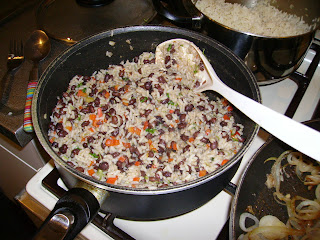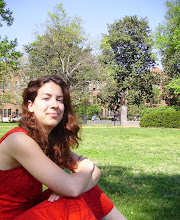 This meal is special....firstly because it is the 4oth meal and thus is the half-way mark of my trip. Secondly because it is Costa Rican, and the food brings back memories of my exchange year in that Central-American country seven years ago. It's great to laugh and chat again with people who have been to the same places and speak Spanish the Costa Rican way. Saying vos instead of tu will sound ridiculous in almost any other country.
This meal is special....firstly because it is the 4oth meal and thus is the half-way mark of my trip. Secondly because it is Costa Rican, and the food brings back memories of my exchange year in that Central-American country seven years ago. It's great to laugh and chat again with people who have been to the same places and speak Spanish the Costa Rican way. Saying vos instead of tu will sound ridiculous in almost any other country.Fresia is a Ph.D. student of Physics here in the Netherlands, and her friend Marcela as well, but in Brazil. They have invited Carlos as well, and even though he is Colombian, he is in charge
 of the patacones...the twice-fried plantains both countries have in common (see Meal 20. Colombian Bandeja Paisa).
of the patacones...the twice-fried plantains both countries have in common (see Meal 20. Colombian Bandeja Paisa).A truly unique part of Costa Rican cuisine, though, is the world famous Salsa Lizano (at right) that Fresia specially brought from back home to give her food that typical flavour. The weird thing is that when I look at the bottle a bit closer, the Lizano company turns out to be owned by Unilever, a British-Dutch food (and cleaning
 products) conglomerate. That's globalization for you!
products) conglomerate. That's globalization for you!Fresia has a whole collection of tico (=Costa Rican) food and condiments, but the locally famous spirit guaro isn't included. "I'm afraid of giving my country a bad name if I let people here drink that!", she admits.
Serving the very popular ceviche is a better tactic. This delicious and refreshing dish made of raw fish, onions, lemon juice and cilantro (coriander leaves) is easy to make and often served for lunch.
But more "typically tico" is the rice and beans called gallo pinto. It's supposedly name after the "painted rooster" whose black and white feathers are similar to the colours of this dish. During my year in Costa Rica I must have had this about 365 times...it can be served for breakfast, lunch or dinner! Cilantro, fried onions and garlic and Salsa Lizano give it a typical taste, and the chopped bell peppers are added for a touch of colour.
Marcela remembers how her mother made rice attractive for her kids by adding peas, grated carrots or bell pepper.

As we eat, we listen to traditional songs that were always played at Fresia's dance classes. Though in the discos you will mostly hear salsa, merengue with some pop and reggae thrown in, quite a lot of young Costa Ricans have learnt folk dancing at school or university.
I mention how I was surprised that my host family hadn't learned to spell my name correctly after living with them for half a year (Yeny instead of Jenny). Later I noticed many Costa Ricans don't care about the spelling of their own name. One day it's Mainor, the other day Minor. And
 you wouldn't believe the quantity of boys named Jhonny!
you wouldn't believe the quantity of boys named Jhonny!Fresia laughs:"You wouldn't think so, but my name has been spelled in I don't know how many different ways! Fressia, Frezia, Frecia..."
What is also different, is the fact that many people (mostly younger males) are always referred to by some strange nickname. El Muerto (the Dead Guy) for an unusually pale friend, Watchi for someone who looked like a local watchman, Chile for a guy who was from there originally, etc. On my last trip I was presented to a Repollo (Cabbage)...his backpack bore the slogan: "Say no to violence against vegetables!"
If you'd like to try your hand at ceviche, here's the recipe.

1 comment:
wow, i think what you're doing is great. i only wish i thought of it first! :D if i had a kitchen, i'd definitely make you something malaysian ;)
cheers
Post a Comment